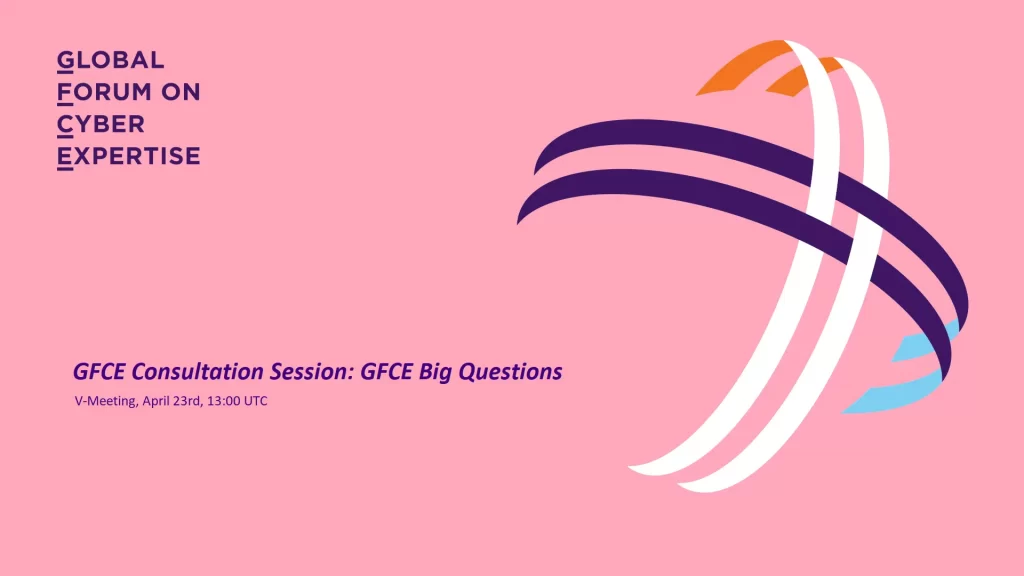GFCE Consultation Session: GFCE Big Questions
GFCE V-Meeting “GFCE Consultation Session: GFCE Big Questions” | 23 April 2020
During the interactive session “GFCE Big Questions”, the GFCE Community was given the opportunity to discuss and provide feedback on the GFCE internal structures and processes. The aim of this session was to look ahead to the future, gathering the input of participants in order to get ideas and feedback on the deliverables that will result from the discussions in upcoming sessions of the GFCE V-Meeting, including: a Revised GFCE Terms of Reference, building blocks of the GFCE Way Forward 2022, and a Revised GFCE Working Groups Mandate & Responsibilities.
The main outcomes of this interactive session are divided into the following three pillars:
GFCE Mandate and Strategy
A. As the GFCE Mission is to strengthen cyber capacity and expertise globally by being a pragmatic and action-oriented platform for international collaboration, the participants provided their views on how the need for and delivery of cyber capacity building will change. Citing a higher demand for CCB especially due to the Covid-19 crisis, participants highlighted a need for better coordination and collaboration across different sectors and stakeholder groups, being inclusive of different perspectives. Focusing on these elements will assist members in being able to effectively share their knowledge, resources and expertise and develop CCB initiatives on both local and international scale.
B. As the GFCE has a strategic goal to become the global coordination platform for cyber capacity building, the GFCE community was asked to share its thoughts and ideas on the steps that the GFCE needs to take in order to achieve this. The participants pointed out the importance of having greater internal and external visibility and expanding the outreach engagement in order to move beyond coordination to better use the available resources of the GFCE members and partners and to fill the gaps in capacity building efforts with new practices and mechanisms. In addition, members mentioned the need to continue to engage with multilateral processes such as those ongoing in the UN First Committee, taking into account the role the GFCE and its community has played in these processes thus far and how it intends to do so going forward.
GFCE Community & Active involvement
A. The GFCE Community was also given the opportunity to give feedback on how the GFCE can ensure greater involvement by all participants and how it can better leverage contributions by the private sector and civil society. The main feedback was that the GFCE efforts are reflected in the community but there is still room for improvement. The GFCE should work on enhancing communication among the different involved stakeholders, encourage more initiatives from all actors, create more research projects for and by the Working Groups and showcase the achievements of GFCE initiatives. One important outcome raised, was the need for regional coordination and the empowerment of local communities (e.g. Global South) with knowledge and expertise in order to be more encouraged to get involved in cyber capacity building efforts.
Regarding the contributions from the private sector and civil society, the Community responded by pointing out the importance of higher involvement from the private sector for projects’ development, and the need for increased GFCE participation in civil society platforms – especially on a local level – in order to raise awareness on the GFCE and encourage civil society stakeholders to become actively involved in the GFCE processes and initiatives.
B. The participants also provided input on the Working Group processes, first by highlighting the effectiveness of the current working methods and then by providing other suggestions for future practices, such as encouraging smaller projects on different aspects of cyber capacity building, having clear structures and working framework, continuing the match-making function by bringing together stakeholders with the same interests, and provide a clear vision of the upcoming GFCE initiatives and achievements.
Governance
The GFCE Community was also called upon to provide feedback regarding the recent creation of the GFCE Foundation Board, looking at how the Board can help support the efforts for GFCE multi-donor funding as well as how the Board, together the GFCE Secretariat, should best share information with the GFCE Community. Regarding multi-donor funding issues, the main feedback was that the identification of specific projects can attract the interest of different sponsors and that constant collaboration with international organization and business and the ongoing visibility of the GFCE achievements will ultimately lead to the goal of fundraising. In addition, the Community praised the efforts of the GFCE Secretariat and highlighted the importance of having constant communication with all members and partners, implementing regular meetings and bringing together different stakeholders to achieve common goals on cyber capacity building efforts.
After different suggestions were raised and valuable feedback on the “GFCE Big Questions” was provided by the GFCE Community, the session ended with highlighting the need for better and closer cooperation between all different actors involved in cyber capacity building efforts and mechanisms, and the importance of the role of the GFCE in the process of achieving local and international collaboration by being the global coordinating platform for cyber capacity building in the future.
